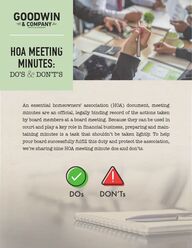
Return to flip book view
HOA MEETINGMINUTES:DO’S & DON’T’SAn essential homeowners’ association (HOA) document, meeting minutesare an official, legally binding record of the actions taken by board members at a board meeting.Because they can be used in court and play a key role in financial business, preparing and main-taining minutes is a task that shouldn’t be taken lightly. To help your board successfully fulfill this duty and protect the association, we’re sharing nine HOA meeting minute dos and don’ts.
ADER TO OVRIN DOUMNS AN LAS.INLUE VEY ETIL.Theboard secretary, appointed recorder, or assistant secretary is responsible for taking minutes. These records are precious, so it’s crucial to adhere to your governing documents and local, state, and federal laws and regulations. Make sure you have a clear understanding of when minutes must be available to homeowners, what to include, how to store them, and more. KEP IT RIF.Due to minutes only reflecting actions, they should be brief and concise. Use your meeting agenda or atemplateas a guide and try to limit them to about two pages. Keeping things short and sweet will not only cut down on confusion and make the board’s job easier, but it’ll also make homeowners more likely to read them, attend future meetings, and engage with the community.HOA meeting minutes are a record of the actions taken by board members at a meeting—not a complete transcript of what was said and opinions that were expressed.Remain objective and exclude unrelated conversations, irrelevant commentary, or details from discussions that don’t lead to a conclusion or decision in minutes.• Association name and meeting type (monthly, annual, special, etc.)• Meeting location and date• Time the meeting was called to order and adjourned• Present and absent board members and their office positions• Approval of prior minutes• Officer and committee member reports• New business that was discussed and open discussions• All motions (whether or not they were approved) and actions that were taken• Names of those who voted for a motion, dissented, and abstained• All financial transactions (reserve expenses, opening or closing of a bank account, etc.)While it varies by association, most HOAs must have the following in their minutes:
The longer the secretary waits to prepare minutes, the more likely they are to forget crucial details and produce an unreliable document. To prevent inconsistencies, your board may be able to capture an audio or video recording of a meeting; however, community rules and rights vary, so check your governing documents to confirm permissions before recording. To best guarantee accuracy and avoid liability, the secretary or appointee should take personal notes during the meeting, ask for clarification when necessary, and send finalized minutes for other board members to review as soon as possible.DEAY REARTIN.Keep in mind that board members and residents aren’t the only people who read or have access to minutes. It’s common for new residents, realtors, bankers, and mortgage companies to request minutes for sales transactions. Always ask yourself if you’d be comfortable reading minutes to a party outside of the association. Make sure YOUR MEETING MINUTES:• Exclude personal and sensitive information• Are formatted correctly• Are easy to understand• Contain zero grammatical and spelling errorsCNIR TEY’E CEPABE FO OTER TO IW.Because of their importance, minutes should be retained indefinitely. Specific laws for maintaining, storing, and distributing minutes and other vital documents—both digitally and physically—differ by location and community, so always consult your governing documents or associationlawyerbefore proceeding.GE RI OF HE.
DALLAS • FORT WORTH • AUSTIN • SAN ANTONIO • HOUSTON Boards are legally required to take minutes at all official meetings. However, if a meeting doesn’tmeet quorum, it isn't official, and no minutes should be taken. Refer to your association’s governing documents for quorum obligations and note all missed or canceled meetings in the minute book for future records.TAE TEM T EVR OFIIL ETIG.Meeting minutes not only help keep the community on track, prevent misunderstandings, and guide future leaders, but they also can be used to protect the association in a court of law. If legal issues or proceedings arise, minutes can be subpoenaed and used as evidence. Minutes should be straightforward and about the business at hand. Refrain from using biased language or conflicting information that open the community to liability.ENUR TEY’ HOD UP N CUR.Approving minutes is one of the most important parts of a meeting. During each board meeting where quorum is met, all board members must approve the minutes from the previous meeting. After approval, the secretary must sign the minutes to make them official.FOGE APROAL.